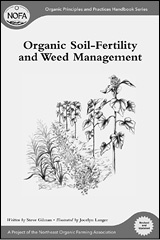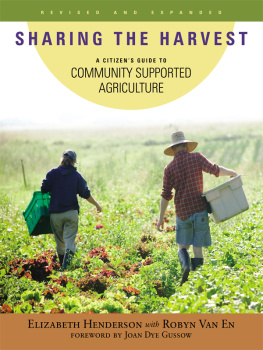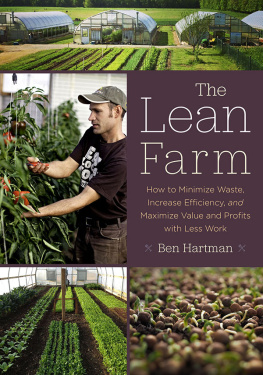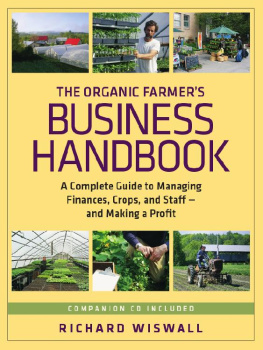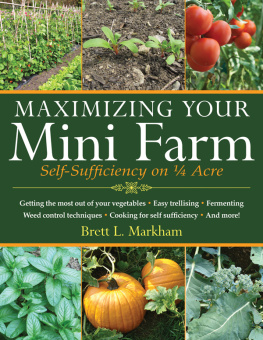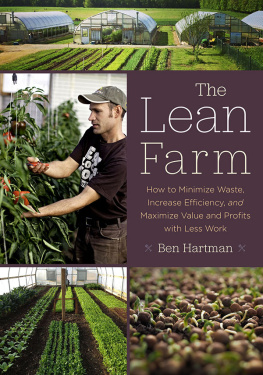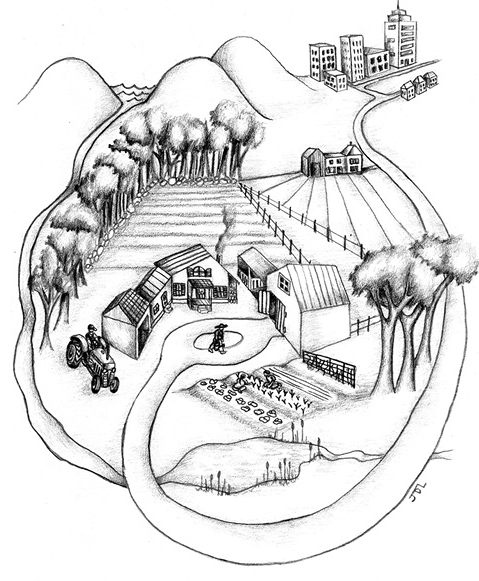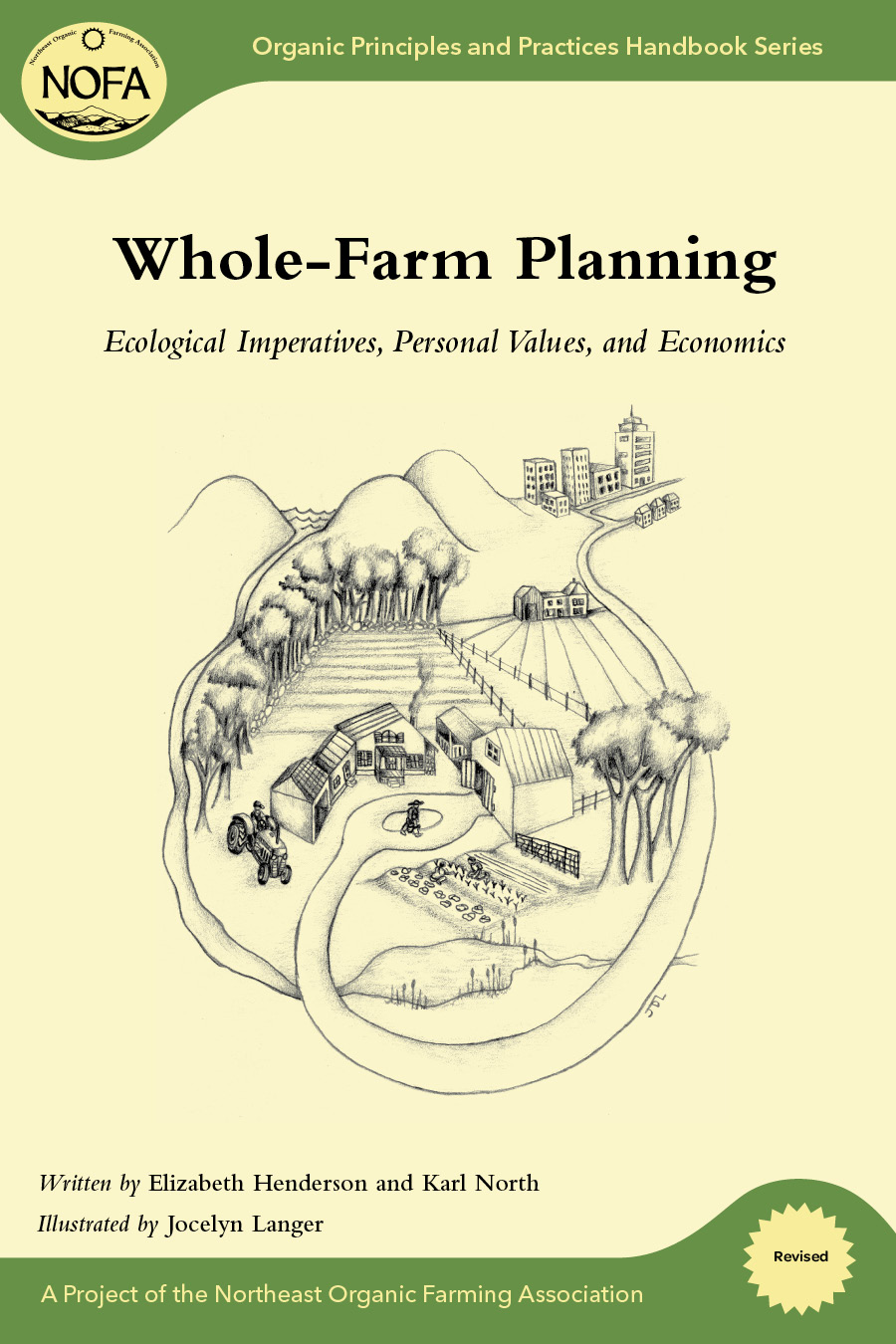
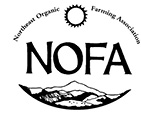
Organic Principles and Practices Handbook Series
A Project of the Northeast Organic Farming Association
Whole-Farm Planning
Ecological Imperatives, Personal Values, and Economics
Revised
Elizabeth Henderson
and Karl North
Illustrated by Jocelyn Langer
Chelsea Green Publishing
White River Junction, Vermont
Copyright 2004, 2011 by the Northeast Organic Farming Association Interstate Council.
All rights reserved.
No part of this book may be transmitted or reproduced in any form by any means without permission in writing from the publisher.
Editorial Coordinator: Makenna Goodman
Project Manager: Bill Bokermann
Copy Editor: Cannon Labrie
Proofreader: Helen Walden
Indexer: Peggy Holloway
Designer: Peter Holm, Sterling Hill Productions
Printed in the United States of America
First Chelsea Green printing March, 2011
10 9 8 7 6 5 4 3 2 1 11 12 13 14
Our Commitment to Green Publishing
Chelsea Green sees publishing as a tool for cultural change and ecological stewardship. We strive to align our book manufacturing practices with our editorial mission and to reduce the impact of our business enterprise in the environment. We print our books and catalogs on chlorine-free recycled paper, using vegetable-based inks whenever possible. This book may cost slightly more because we use recycled paper, and we hope youll agree that its worth it. Chelsea Green is a member of the Green Press Initiative, a nonprofit coalition of publishers, manufacturers, and authors working to protect the worlds endangered forests and conserve natural resources. Whole-Farm Planning was printed on Joy White, a 30-percent postconsumer recycled paper supplied by Thomson-Shore.
Library of Congress Cataloging-in-Publication Data
Henderson, Elizabeth, 1943
Whole-farm planning : ecological imperatives, personal values, and economics / Elizabeth Henderson and Karl North ; illustrated by Jocelyn Langer.
p. cm. -- (Organic principles and practices handbook series)
A project of the Northeast Organic Farming Association.
Originally published: Barre, MA : NOFA Interstate Council, c2004.
Includes index.
ISBN 978-1-60358-355-8
1. Organic farming. 2. Farm management. I. North, Karl. II. Northeast Organic Farming Association. III. Title. IV. Series: Organic principles and practices handbook series.
S605.5.H46 2011
631.584068--dc22
2010049585
eISBN: 9781603583565
Chelsea Green Publishing Company
Post Office Box 428
White River Junction, VT 05001
(802) 295-6300
www.chelseagreen.com
Best Practices for Farmers and Gardeners
The NOFA handbook series is designed to give a comprehensive view of key farming practices from the organic perspective. The content is geared to serious farmers, gardeners, and homesteaders and those looking to make the transition to organic practices.
Many readers may have arrived at their own best methods to suit their situations of place and pocketbook. These handbooks may help practitioners review and reconsider their concepts and practices in light of holistic biological realities, classic works, and recent research.
Organic agriculture has deep roots and a complex paradigm that stands in bold contrast to the industrialized conventional agriculture that is dominant today. Its critical that organic farming get a fair hearing in the public arenaand that farmers have access not only to the real dirt on organic methods and practices but also to the concepts behind them.
About This Series
The Northeast Organic Farming Association (NOFA) is one of the oldest organic agriculture organizations in the country, dedicated to organic food production and a safer, healthier environment. NOFA has independent chapters in Connecticut, Massachusetts, New Hampshire, New Jersey, New York, Rhode Island, and Vermont.
This handbook series began with a gift to NOFA/Mass and continues under the NOFA Interstate Council with support from NOFA/Mass and a generous grant from Sustainable Agriculture Research and Education (SARE). The project has utilized the expertise of NOFA members and other organic farmers and educators in the Northeast as writers and reviewers. Help also came from the Pennsylvania Association for Sustainable Agriculture and from the Maine Organic Farmers and Gardeners Association.
Jocelyn Langer illustrated the series, and Jonathan von Ranson edited it and coordinated the project. The Manuals Project Committee included Bill Duesing, Steve Gilman, Elizabeth Henderson, Julie Rawson, and Jonathan von Ranson. The committee thanks SARE and the wonderful farmers and educators whose willing commitment it represents.
The first commandment of the Earth is: enough. Just so much and no more. Just so much soil. Just so much water. Just so much sunshine. Everything born of the earth grows to its appropriate size and then stops. The planet does not get bigger, it gets better. Its creatures learn, mature, diversify, evolve, create amazing beauty and novelty and complexity, but live within absolute limits.
Donella Meadows, The Laws of the Earth and the Laws of Economics
Contents
Particularity and separability are infirmities of the mind, not characteristics of the universe.
Do you have trouble making decisions about your farm? Have you made decisions that seemed exciting at first but later turned out to be mistakes? Do you want to shape your farming and your life so that the many pieces fit together in harmony? If so, we believe this manual will help you.
Many of us who are drawn to organic farming and gardening tend to see the world as patterns of intricately interrelated systems. We share this perspective with so-called primitive peoples around the world who live with this connectedness that our fragmented, industrialized society has hidden from advanced, modern people. Either from our innate cast of mind or from finding ourselves on a spiritual path, we have trouble with reductive science and the division of knowledge into separate disciplines, each with its own turf, jargon, and boundaries. We sense instinctively that we cannot do one thing on a farm in isolation, that if we make a change, everything that is connected with that change will shift too. We do not have to make a paradigm shift to grasp holism and the notion that the whole is greater than the sum of its parts. Organic and biodynamic teachings encourage us to think in terms of cycles and interrelationships.
But even with these good instincts we sometimes make bad decisions because we are distracted, under pressure, fail to consult with all the people involved, or do not think through the possible ripple effects. Whole-farm planning offers a way to slow down a little, and balance and systematize our decision-making process so that we do not indulge ourselves in foolish or expensive tangents that weaken our farm and leave us discouraged. Its a tool that functions like a pilots checklist. A little training and self-discipline are involved, but the improved results will make it worth the effort. The method we suggest should not be taken as a dogmatic recipe. Rather, it is a direction, which may lead some farmers, as it did the Flack Family in Vermont, to create their own system in concert with their particular style or spiritual or personal beliefs.

